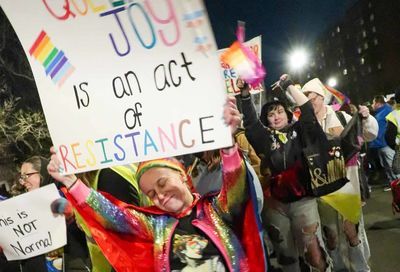A Canadian Lesson
Commenatry: OutRight
The new Conservative government in Canada has lost its promised attempt to repeal same-sex marriage in that country. The vote in Canada’s Parliament was even more favorable to gay marriage than it was in 2005, with more Conservatives voting for it than last time. According to a story in the Toronto Sun, this appears to end the matter in Canada:
”Prime Minister Stephen Harper said he heard the message and will respect it. ‘We made a promise to have a free vote on this issue, we kept that promise, and obviously the vote was decisive and obviously we’ll accept the democratic result of the people’s representatives,’ Harper said. ‘I don’t see reopening this question in the future.’
”The question put to MPs [members of Parliament] was whether they wanted to see legislation drafted to reinstate the traditional definition of marriage, while respecting the existing marriages of gays and lesbians. That Conservative motion failed 175-123. . . .
”Ultimately, more MPs supported same-sex marriage than in the last vote on the issue in June 2005. During that charged vote last year, only three Tories voted in favour of expanding the definition of marriage. Today, the number who approved the status quo was 13, including high-profile politicians such as Foreign Affairs Minister Peter MacKay, Transport Minister Lawrence Cannon and International Development Minister Josee Verner….”
The action in Canada follows what has become a familiar pattern. Same-sex marriage emerges (sometimes through judicial action, sometimes not), which is followed by strong political resistance that weakens over time as people in the jurisdiction grow accustomed to the idea and see no ill effects from recognizing gay families in marriage.
”The House of Commons has been dealing with the issue of same-sex marriage in earnest since 2002, when the Commons voted overwhelmingly to support the traditional definition of marriage. In 2003, however, the Ontario Court of Appeal ruled that barring same-sex couples from marriage was unconstitutional.
”Gays and lesbians began marrying in the province, and soon other jurisdictions faced similar rulings and began issuing licences. About 12,000 gay Canadians, as well as foreign visitors, have been married in the last three years.”
A similar pattern emerged in Massachusetts after the Goodridge decision in 2003. There was a swift and strong political resistance to the decision, manifested in an initial vote to repeal gay marriage by constitutional amendment in the state Legislature.
The next year, after an election in which opponents of gay marriage lost seats in the state Legislature, there was much less support for repeal and the effort was overwhelmingly rebuffed. The Republican leader in the state senate stated that after a year of allowing gay marriage in the state he had not detected any changes — except that more people could now get married.
Seeing they no longer had the votes in the state Legislature to enact a state constitutional ban, opponents of gay marriage then tried the tactic of forcing a popular vote on the issue, which would require the support of only a minority of the state Legislature. That may still happen, but it probably won’t succeed if it does. Almost three years into the recognition of gay marriage, with no evidence of ill effects, polls in the state show majorities now supporting gay marriage.
Vermont followed a similar pattern, too. In 2000, when the state Supreme Court ordered the state Legislature to give gay couples equal benefits, there was strong legislative and popular resistance to the idea. In that fall’s election several supporters of civil unions were defeated in a campaign marked by the slogan, ”Take Back Vermont.” But the furor subsided, played no significant role in subsequent elections, and is now over.
In states where the recognition of gay relationships emerged legislatively — like California and Connecticut — popular resistance seems to have been even lower. An effort to place the issue on the ballot in California has so far failed. There has been little or no organized resistance in Connecticut.
More tests of this pattern are coming soon. The New Jersey Legislature has just voted, under pressure from the state supreme court, to extend civil unions to gay couples. It will be interesting to see whether New York and Washington state, whose legislatures will likely be dealing with the issue in the coming months, meet much resistance, and if so, whether that resistance also subsides after the states gain actual experience with recognizing gay families in law.
If the pattern of fierce-resistance-followed-by-acceptance continues, a future history of the struggle for gay marriage might appropriately be titled, Much Ado About Nothing.
Dale Carpenter is a law professor. He can be reached at OutRight@metroweekly.com.
Support Metro Weekly’s Journalism
These are challenging times for news organizations. And yet it’s crucial we stay active and provide vital resources and information to both our local readers and the world. So won’t you please take a moment and consider supporting Metro Weekly with a membership? For as little as $5 a month, you can help ensure Metro Weekly magazine and MetroWeekly.com remain free, viable resources as we provide the best, most diverse, culturally-resonant LGBTQ coverage in both the D.C. region and around the world. Memberships come with exclusive perks and discounts, your own personal digital delivery of each week’s magazine (and an archive), access to our Member's Lounge when it launches this fall, and exclusive members-only items like Metro Weekly Membership Mugs and Tote Bags! Check out all our membership levels here and please join us today!



















